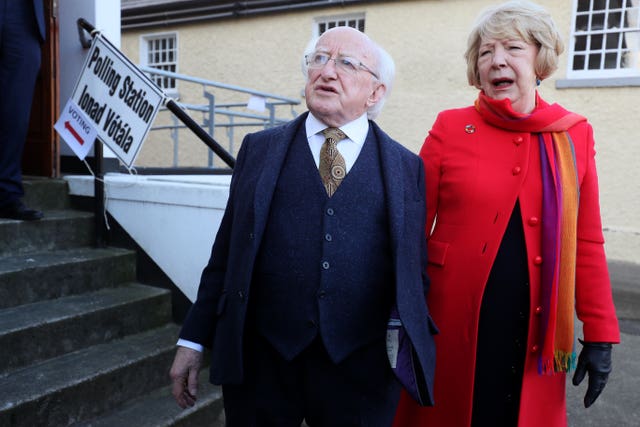Counting getting under way in Ireland’s General Election
An exit poll has indicated an extraordinary statistical dead heat between Fine Gael, Sinn Fein and Fianna Fail auguring a coalition government.

Counting is getting under way following Ireland’s General Election.
An exit poll has indicated an extraordinary statistical dead heat between Fine Gael, Sinn Fein and Fianna Fail – with the three within a percentage point of each other.
The indications that Fine Gael will finish on 22.4%, Sinn Fein on 22.3% and Fianna Fail on 22.2% make some form of coalition government appear inevitable.
If borne out, these results would represent a dramatic breakthrough for Sinn Fein south of the Irish border – challenging the 90-year duopoly of the Republic’s two main parties.
The odds would still be stacked against Mary Lou McDonald leading the next government as taoiseach since Sinn Fein only fielded 42 candidates in the race for the Dail parliament’s 160 seats.
None of the three parties are expected to reach the 80-seat threshold to enable it to govern on its own, and a coalition administration of some complexion is almost inevitable.
Brexit did not feature prominently in the election campaign which was instead dominated by domestic issues like spiralling rental prices, record-breaking homeless numbers, controversy over the state pension age and a struggling health service.
There appears to be a mood for change, and the exit poll also suggested that Sinn Fein attracted support from younger voters who want to end Fine Gael’s nine years in power – but are unwilling to trust Fianna Fail again after the financial crash that tarnished its last term of office.
Meanwhile, the Green Party has been forecast to take 7.9%, Labour 4.6%, the Social Democrats 3.4% and Solidarity/People Before Profit 2.8%.
Negotiations to form a coalition government are likely to be complex with both Fine Gael and Fianna Fail previously stating they would not enter an agreement with Sinn Fein.
Following the last Irish election in 2016, negotiations between Fianna Fail and Fine Gael that eventually enabled the latter to form a minority coalition government took 70 days.

The exit poll, carried out by the Irish Times’ pollsters Ipsos MRBI, was commissioned jointly by The Irish Times, RTE, TG4 and UCD.
Counting commenced at 9am to tot up the final results from Ireland’s 39 constituencies.
These constituencies vary from three, four and five of the Dail’s (Irish Parliament) 159 seats.
The outgoing Ceann Comhairle (speaker) is re-elected automatically, representing the 160th member.
TDs are elected using the proportional representation system, with voters allocating their preferences in a single transferable vote.
Of the leaders of the three main parties, Fine Gael chief and Taoiseach Leo Varadkar will find out if he has retained his seat at Phibblestown Community Centre in Dublin.
Sinn Fein president Mary Lou McDonald will find out if she has been returned at the RDS, while Fianna Fail leader Micheal Martin will watch his votes being counted at Nemo Rangers GAA club in his native Cork city.
Business minister Heather Humphreys has said it was not a mistake for Fine Gael to put Brexit at the centre of its re-election strategy after an exit poll found only 1% of people cited Brexit as a factor in how they voted.
“A lot of people obviously thought Brexit is over… Brexit is far from over,” she told RTE radio one.
“Brexit is still a big threat but some people live in the moment and a lot of people thought Brexit has gone away – it has not gone away.”
Asked if she thought it was a mistake by party strategists, she said: “No, I don’t because at the end of the day we have told people the facts and we have told them the truth. We have had a difficult campaign because after nine years of government people want to see something different.”
Ms Humphreys expressed confidence in Mr Varadkar to remain as leader of Fine Gael after the election and ruled out the party going into coalition with Sinn Fein. “The gap is too wide between us and Sinn Fein,” she said.
“I am very happy for Leo Varadkar will continue to lead Fine Gael party, the last few days have seen a swing towards Fine Gael and that shows that the Taoiseach performed well in the TV debates and that people began to think change might not be for the better, in fact change might be for the worse.”





